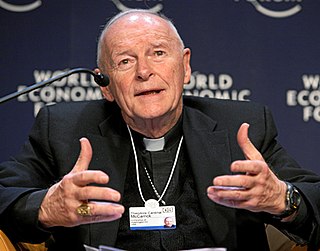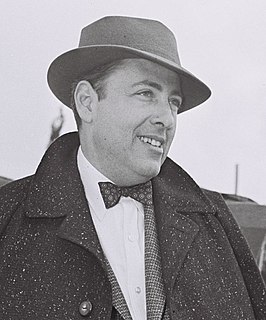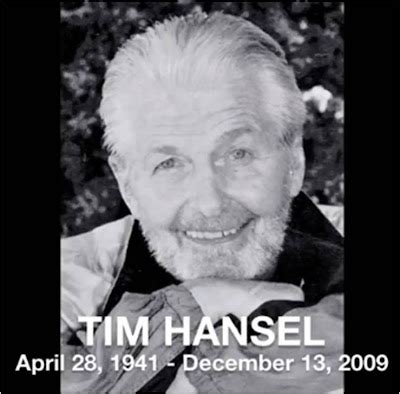A Quote by Theodore Edgar McCarrick
If it were not for the Eucharist, if it were not for this marvelous manifestation of God's love, if it were not for this opportunity to place ourselves in the very real presence of God, if it were not for the sacrament that reminds us of His love, His suffering and His triumph, which indeed perpetuates for us His saving sacrifice on the cross, I am sure that I could never face the challenges of my life, my own weakness and sinfulness and my own need to reach out to the Living God.
Quote Topics
Am
Challenges
Could
Cross
Eucharist
Face
God
God's Love
His
His Love
Indeed
Life
Living
Love
Manifestation
Marvelous
My Life
My Own
Need
Never
Opportunity
Ourselves
Out
Own
Place
Presence
Presence Of God
Reach
Reach Out
Real
Reminds
Sacrament
Sacrifice
Saving
Sinfulness
Suffering
Sure
Triumph
Us
Very
Weakness
Were
Which
Related Quotes
Many years ago, our father Ibrahim (AS) made a choice. He loved his son. But He loved God more. The commandment came to sacrifice his son. But it wasn't his son that was slaughtered. It was his attachment to anything that could compete with his love for God. So let us ask ourselves in these beautiful days of sacrifice, which attachments do we need to slaughter?
If God wishes to be born as man and to unite mankind in the fellowship of the Holy Ghost, He suffers the terrible torment of having to bear the world in its reality. It is a crux; indeed, He Himself is His own cross. The world is God's suffering, and every individual human being who wishes even to approach his own wholeness knows very well that this means bearing his own cross. But the eternal promise for him who bears his own cross is the Paraclete.
The problem of reconciling human suffering with the existence of a God who loves, is only insoluble so long as we attach a trivial meaning to the word "love", and look on things as if man were the centre of them. Man is not the centre. God does not exist for the sake of man. Man does not exist for his own sake. "Thou hast created all things, and for thy pleasure they are and were created." We were made not primarily that we may love God (though we were made for that too) but that God may love us, that we may become objects in which the divine love may rest "well pleased".
To some, the image of a pale body glimmering on a dark night whispers of defeat. What good is a God who does not control his Son's suffering? But another sound can be heard: the shout of a God crying out to human beings, "I LOVE YOU." Love was compressed for all history in that lonely figure on the cross, who said that he could call down angels at any moment on a rescue mission, but chose not to - because of us. At Calvary, God accepted his own unbreakable terms of justice. Any discussion of how pain and suffering fit into God's scheme ultimately leads back to the cross.
Let us fill a cup and drink to that most noble, ridiculous, laughable, sublime figure in our lives... The Young Man Who Was. Let us drink to his dreams, for they were rainbow-colored; to his appetites, for they were strong; to his blunders, for they were huge; to his pains for they were sharp; to his time for it was brief; and to his end, for it was to become one of us.
A God who draws near out of love, the Holy Father continued, walks with His people, and this walk comes to an unimaginable point. We could never have imagined that the same Lord would become one of us and walk with us, be present with us, present in His Church, present in the Eucharist, present in His Word, present in the poor, He is present, walking with us. And this is closeness: the shepherd close to his flock, close to his sheep, whom he knows, one by one.
It has been said that God's gift is also indescribable because of the grace by which it is given. God, who is rich in mercy, gave the world the gift of His dear Son while we were at enmity with Him. Paul says: 'But God commendeth His love toward us, in that, while we were yet sinners, Christ died for us' (Rom. 5:8). Therefore, in Him we are freely given all things: redemption, forgiveness of sins, righteousness, peace, hope, wisdom and knowledge.
That his prayer was nothing else but a sense of the presence of GOD, his soul being at that time insensible to everything but Divine love: and that when the appointed times of prayer were past, he found no difference, because he still continued with GOD, praising and blessing Him with all his might, so that he passed his life in continual joy; yet hoped that GOD would give him somewhat to suffer, when he should grow stronger.
When we believe that we ought to be satisfied, rather than God glorified, we set God below ourselves, imagine that He should submit His own honor to our advantage; we make ourselves more glorious than God, as though we were not made for Him, but He made for us; this is to have a very low esteem of the majesty of God.
For many people, God is a frightening idea. Asking God for help doesn't seem very comforting if we think of Him as something outside ourselves, or capricious, or judgmental. But God is love and He dwells within us. We are created in His image, or mind, which means that we are extensions of His love, or Sons and Daughters of God.
Jesus came among us to show and teach the life for which we were made. He came very gently, opened access to the governance of God with him, and set afoot a conspiracy of freedom in truth among human beings. Having overcome death he remains among us. By relying on his word and presence we are enabled to reintegrate the little realm that makes up our life in the infinite rule of God. And that is the eternal kind of life. Caught up in his active rule, our deeds become an element in God’s eternal history. They are what God and we do together, making us part of his life and him a part of ours.
God has spoken very boldly about his desire to be a presence in our lives. If I want to heal the ache and loneliness in my own life, one of the things I need to do is get away, alone with God. . . . In the silence God will speak to you most powerfully. Too often his words to us get muffled, lost, or covered by the crowd of many noises both inside and outside of us. We must have a quiet heart in order to hear God's distinctive message to us.
God made the world for the delight of human beings-- if we could see His goodness everywhere, His concern for us, His awareness of our needs: the phone call we've waited for, the ride we are offered, the letter in the mail, just the little things He does for us throughout the day. As we remember and notice His love for us, we just begin to fall in love with Him because He is so busy with us -- you just can't resist Him. I believe there's no such thing as luck in life, it's God's love, it's His.
Do you wish to learn the secret of true Eucharistic prayer? Consider, then, all the mysteries in the light of the Blessed Sacrament. It is a divine prism through which they can all be studied. The Holy Eucharist is, indeed, 'Jesus Christ, yesterday, and today, and the same forever' (Heb 13:8). In this Sacrament He glorifies all the mysteries of His life and prolongs, as it were, the exercise of all His virtues. The Eucharist is, in a word, the great Mystery of our faith to which all Catholic truths lead

































